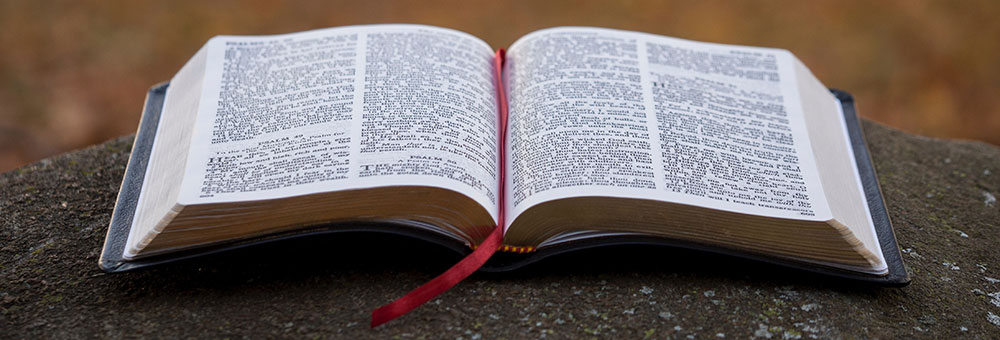“Thy Word have I hid in my heart…”
What We Believe

The Bible
The 39 Articles, a 1536 foundational document of Anglican theology, relates that “Holy Scripture containeth all things necessary to salvation.” The Scriptures, comprised of the Old and New Testament, as well as some apocryphal texts, were written under the inspiration of the Holy Spirit.
The Bible is of extraordinary importance to Episcopal worship; during a Sunday morning service, the congregation will usually hear at least three readings from Scripture, and much of the liturgy from The Book of Common Prayer is based explicitly on the Biblical texts. According to the Catechism, “We understand the meaning of the Bible by the help of the Holy Spirit, who guides the Church in the true interpretation of the Scriptures” (p. 853-4)
There are several translations of the Bible authorized for use, including:
- King James or Authorized Version (the historic Bible of The Episcopal Church)
- English Revision (1881)
- American Revision (1901)
- Revised Standard Version (1952)
- Jerusalem Bible (1966)
- New English Bible with the Apocrypha (1970)
- Good News Bible / Today’s English Version (1976)
- New American Bible (1970)
- Revised Standard Version, an Ecumenical Edition (1973)
- New International Version (1978)
- New Jerusalem Bible (1987)
- Revised English Bible (1989)
- New Revised Standard Version (1990)
- Common English Bible (2012)
The Book of Common Prayer
The Book of Common Prayer is a treasure chest full of devotional and teaching resources for individuals and congregations, but it is also the primary symbol of our unity, as Armentrout and Slocum note in their An Episcopal Dictionary of the Church, that “Anglican liturgical piety has been rooted in the Prayer Book tradition since the publication of the first English Prayer Book in 1549.”
We, who are many and diverse, come together in Christ through our worship, our common prayer. The prayer book, most recently revised in 1979, contains our liturgies, our prayers, our theological documents, and much, much more.
DOWNLOAD
The Creeds
Creeds are statements of our basic beliefs about God. The term comes from the Latin credo, meaning I believe.
While we will always have questions about God, the Church, and our own faith, we have two foundational creeds that we use during worship: the Apostles’ Creed used at baptism and daily worship, and the Nicene Creed used at communion. In reciting and affirming these creeds, we join Christians across the world and throughout the ages in affirming our faith in the one God who created us, redeemed us, and sanctifies us.
The Apostles’ Creed
I believe in God, the Father almighty,
creator of heaven and earth;
I believe in Jesus Christ, his only Son, our Lord.
He was conceived by the power of the Holy Spirit
and born of the Virgin Mary.
He suffered under Pontius Pilate,
was crucified, died, and was buried.
He descended to the dead.
On the third day he rose again.
He ascended into heaven,
and is seated at the right hand of the Father.
He will come again to judge the living and the dead.
I believe in the Holy Spirit,
the holy catholic Church,
the communion of saints,
the forgiveness of sins
the resurrection of the body,
and the life everlasting. Amen.

The Nicene Creed
We believe in one God,
the Father, the Almighty,
maker of heaven and earth,
of all that is, seen and unseen.
We believe in one Lord, Jesus Christ,
the only Son of God,
eternally begotten of the Father,
God from God, Light from Light,
true God from true God,
begotten, not made,
of one Being with the Father.
Through him all things were made.
For us and for our salvation
he came down from heaven:
by the power of the Holy Spirit
he became incarnate from the Virgin Mary,
and was made man.
For our sake he was crucified under Pontius Pilate;
he suffered death and was buried.
On the third day he rose again
in accordance with the Scriptures;
he ascended into heaven
and is seated at the right hand of the Father.
He will come again in glory to judge the living and the dead,
and his kingdom will have no end.
We believe in the Holy Spirit, the Lord, the giver of life,
who proceeds from the Father and the Son.
With the Father and the Son he is worshiped and glorified.
He has spoken through the Prophets.
We believe in one holy catholic and apostolic Church.
We acknowledge one baptism for the forgiveness of sins.
We look for the resurrection of the dead,
and the life of the world to come. Amen.
The Catechism
Offered in a question-and-answer format, the Catechism found in the back of The Book of Common Prayer (pp. 845-862) helps teach the essential truths of the Christian faith and how Episcopalians live those truths. It is also intentionally organized so as to “provide a brief summary of the Church’s teaching for an inquiring stranger who picks up a Prayer Book,” with headings such as Human Nature, God the Father, The Old Covenant, The Ten Commandments, Sin and Redemption, God the Son, The New Covenant, The Creeds, The Holy Spirit, The Holy Scriptures, The Church, The Ministry, Prayer and Worship, The Sacraments, Holy Baptism, The Holy Eucharist, Other Sacramental Rites, and The Christian Hope.
The Sacraments
Our Anglican tradition recognizes sacraments as “outward and visible signs of inward and spiritual grace.” (The Book of Common Prayer, p. 857) Holy Baptism and the Eucharist (or Holy Communion) are the two great sacraments given by Christ to his Church.
In the case of Baptism, the outward and visible sign is water, in which the person is baptized in the Name of the Father, and of the Son, and of the Holy Spirit; the inward and spiritual grace is union with Christ in his death and resurrection, birth into God’s family the Church, forgiveness of sins, and new life in the Holy Spirit. In the case of the Eucharist, the outward and visible sign is bread and wine, given and received according to Christ’s command. The inward and spiritual grace is the Body and Blood of Christ given to his people, and received by faith.
In addition to these two, there are other spiritual markers in our journey of faith that can serve as means of grace. These include:
- Confirmation: the adult affirmation of our baptismal vows
- Reconciliation of a Penitent: private confession
- Matrimony: Christian marriage
- Orders: ordination to the diaconate, priesthood, or episcopacy
- Unction: anointing those who are sick or dying with holy oil
For more about what Episcopalians believe visit: http://www.norcalepiscopal.org/beliefs–practices or https://www.episcopalchurch.org/what-we-believe

